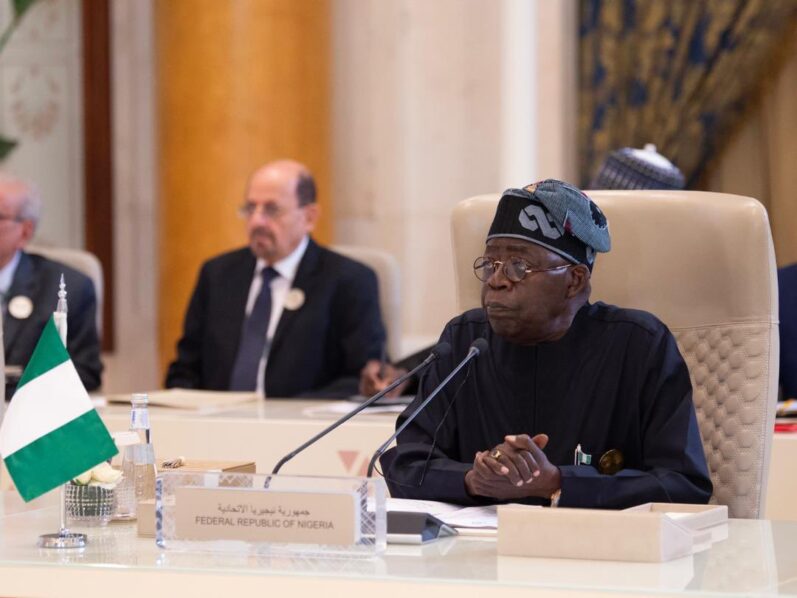
In a nation grappling with significant economic difficulties, President Bola Ahmed Tinubu’s recent request for a multi-billion-dollar loan has sparked widespread debate and concern. This request, directed at the Nigerian Senate, aims to fund critical infrastructure projects and bolster social investment programs.
However, the proposal comes at a contentious time, as Nigeria struggles with ballooning public debt, high inflation, and a population weary of austerity measures.
With national debt exceeding $100 billion and debt servicing consuming a significant portion of federal revenue, the question on many Nigerians’ minds is whether this new borrowing is a step toward economic revitalization or a recipe for further financial strain.
President Tinubu, since assuming office, has embarked on bold reforms, including the removal of fuel subsidies and liberalization of the foreign exchange market. These measures, while praised by international financial institutions, have led to a spike in living costs, with inflation hovering around record highs. The government argues that the proposed loan is essential to sustain these reforms, fund infrastructure development, and alleviate poverty through targeted programs.
Tinubu’s administration has emphasized that investments in infrastructure, such as roads, rail, and energy, will yield long-term economic benefits by attracting foreign direct investment and creating jobs. However, critics contend that the timing of the loan request is questionable, given the prevailing economic challenges facing ordinary Nigerians.
Opposition figures, led by former Vice President Atiku Abubakar, have labeled the loan request “bone-crushing,” arguing that it could push Nigeria further into an unsustainable debt trap. The Peoples Democratic Party (PDP) has called for greater transparency in the government’s fiscal decisions, accusing Tinubu’s administration of failing to provide a clear plan for repayment or the specifics of how the funds will be allocated.
Civil society organizations and economic analysts have echoed these concerns, urging the government to explore alternative revenue sources such as improving tax collection and cutting wasteful expenditures. Some critics point to the lack of visible impact from previous loans, citing ongoing issues with accountability and corruption in public finance management.
Nigeria’s economic challenges are deeply rooted in its overreliance on oil revenues, which have been volatile due to fluctuating global prices and declining production. Efforts to diversify the economy into sectors like agriculture, technology, and manufacturing have shown promise but require sustained investment and policy consistency.
Supporters of the loan argue that without immediate financial injection, key projects critical to economic growth could stall, further compounding the country’s woes. For example, power sector reforms and major transportation initiatives are seen as pivotal to unlocking Nigeria’s economic potential. Proponents also highlight that the loan will complement Tinubu’s broader economic strategy, which includes encouraging private sector participation in key industries.
However, the Senate’s approval of the loan highlights the government’s determination to secure the funds despite mounting opposition. Proponents argue that without this financial injection, key projects critical to economic growth could stall, further exacerbating the country’s woes. Power sector reforms, major transportation initiatives, and infrastructure projects are seen as pivotal to unlocking Nigeria’s economic potential.
Supporters of the loan believe it complements Tinubu’s broader economic strategy, which includes fostering private sector participation in critical industries. They argue that immediate capital is necessary to address urgent developmental needs while positioning the economy for long-term stability and growth.
For many Nigerians, the approval of the loan is not just a fiscal matter but a test of trust in Tinubu’s administration. The public is closely monitoring whether the government will demonstrate fiscal discipline and transparency in utilizing the funds. Transparency International and other watchdog groups have called for detailed reporting, public audits, and stakeholder involvement to ensure that funds are not misappropriated.
The debate over this loan underscores a broader dilemma facing many developing nations: balancing the need for immediate capital to spur growth with the risks of over-indebtedness. With Nigeria’s young and growing population demanding infrastructure, education, and healthcare, the stakes are particularly high. Without prudent financial management, the burden of debt could hinder future development.
As the funds begin to flow following the Senate’s approval, the focus will shift to how effectively the government utilizes them. Will this borrowing pave the way for sustainable growth, or will it exacerbate Nigeria’s financial woes? The outcome will likely shape the trajectory of Tinubu’s presidency and the future of Africa’s largest economy.
For now, Nigerians are left with a mix of hope and skepticism, awaiting tangible results that justify this significant financial commitment
Amishe writes from the Department of Mass Communication, University of Maiduguri






